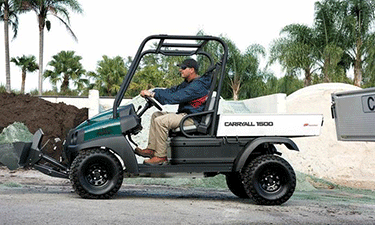 Utility vehicle manufacturers are responding to the changing needs of the park and recreation industry with durable, powerful and versatile UTVs designed to do the work of pickup trucks. It’s important to do your due diligence, however, as there can be big differences in performance, reliability and financing among various manufacturers and models.
Utility vehicle manufacturers are responding to the changing needs of the park and recreation industry with durable, powerful and versatile UTVs designed to do the work of pickup trucks. It’s important to do your due diligence, however, as there can be big differences in performance, reliability and financing among various manufacturers and models.
Maximize Your ROI with These 9 Steps
1. Shop for durability. Club Car’s Commercial Marketing Manager Kurt Meyer suggests looking for vehicles that are built as utility vehicles from the ground up, rather than buying converted golf carts. “Though inexpensive, these vehicles don’t have the suspension or chassis strength you need. And getting parts can be a nightmare,” he says.
Get a strong bed box that won’t rust and is lined with a hard-wearing material, and check the towing capacity, payload capacity and suspension system to be sure the vehicle is appropriate for your site.
2. Choose the right powertrain. Most park and recreation professionals prefer gasoline-driven vehicles, and the best of these have engines with electronic fuel injection (EFI).
“EFI vehicles are game-changers. They’re more powerful and fuel-efficient, easier to maintain and automatically adjust to altitude without jets. Since there is no choke or carburetor, they start right up, even in cold weather,” Meyer says.
Meyer notes, however, that the performance of EFI engines varies, depending on their components and tuning. Also, make sure the vehicle has spark arrestors certified to National Forestry Standards if applicable to your location.
3. Shop for versatility. Buy vehicles that can perform a range of tasks and consider the availability of accessories up front.
Also, consider cabs, enclosures, heaters and fans that can turn your vehicles into year-round assets. “Look for cabs with doors and windshields that sit flush with the frame to keep wind and rain out. Many are simply bolted on,” Meyer says.
4. Don’t toy around. Though often sold as work vehicles, recreational vehicles may reach 50-60 mph, so their suspension systems are built for speed, not payload. “When loaded, the rear suspension tends to sag, reducing ground clearance and unbalancing the vehicle’s weight distribution. They also tend to have short warranties,” Meyer says.
5. Think safety. Make an inventory of the safety equipment you’ll need and make sure the vendor offers it.
Certain areas, particularly municipal park and recreation departments, now require Roll Over Protection Structures (ROPS) and seat belts. In Canada, all federal park and recreation departments require ROPS.
If you buy a 4x2 with a manufacturer’s ROPS, make sure it can be retrofitted with canopies, windshields, enclosures or cabs. Many cannot.
6. Consider seating. Multi-seating UTVs are growing in popularity and are an especially good option for the narrow trails in parks. However, adding a rear-facing, two-passenger seat may eat into your bed space. “Vehicles with four forward-facing seats and an extended bed have room for two crews and their gear,” Meyer says.
7. Look for 4x2s with limited slip differentials. “Many 4x4s are sold due to perception, not need. Well-designed two-wheel-drive systems are sufficient for many applications, especially if the vehicle has a limited slip differential (LSD),” Meyer says.
Here’s why. When vehicles with open differentials get stuck, the power is transferred to the tire with the least traction, so the tires keep spinning. Vehicles with LSDs deliver true on-demand traction whether you’re driving in a straight line or navigating curves.
8. Think ease of use when buying 4x4s. A 4x4 can be a smart choice for construction, climbing hills, covering rough terrain or driving in snow, or mud.
Meyer also suggests you choose an all-wheel drive system that automatically shifts as needed. “If you don’t, you’ll have to train crews to pull the right levers, push the right buttons, and lock and unlock the differentials. Yet they can be getting stuck before they even know it,” he says.
9. Add value with a strong warranty. Look for the longest, most inclusive warranty you can find. This indicates that a manufacturer has confidence in its products and will stand behind them.
Betty Sosnin is Club Car’s Marketing and Public Relations Specialist.

